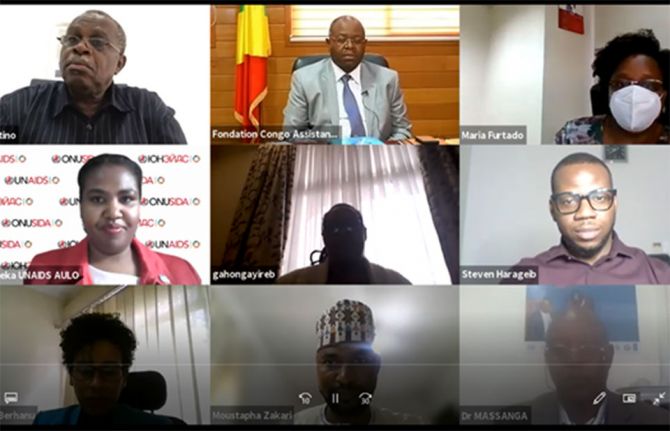

Feature Story
African first lady technical advisers to align OAFLAD’s strategic plan with the new HIV targets
08 July 2021
08 July 2021 08 July 2021In a briefing co-hosted by the Organisation of African First Ladies for Development (OAFLAD) and UNAIDS, technical advisers to the first ladies renewed their commitment to the HIV response in Africa. Capitalizing on the convening, leadership and advocacy role of African first ladies, they highlighted the need to align national and regional efforts to the new Global AIDS Strategy 2021–2026: End Inequalities, End AIDS and the targets in the 2021 United Nations Political Declaration on HIV and AIDS: Ending Inequalities and Getting on Track to End AIDS by 2030.
The briefing focused on presenting the outcomes of the United Nations High-Level Meeting on AIDS, including the Political Declaration on AIDS, the Global AIDS Strategy 2021–2026 and its new targets, the Education Plus initiative and the Common Africa Position on the High-Level Meeting on AIDS. It highlighted the unfinished business of the HIV response and the continued efforts to meet prevention and treatment targets and adopt a rights-based approach that leaves no one behind.
In her welcoming remarks, Berthilde Gahongayire, the UNAIDS Country Director for Ethiopia and the Director, a.i., of the UNAIDS Liaison Office to the African Union and the United Nations Economic Commission for Africa, reiterated the instrumental role played by African first ladies in putting previous United Nations political commitments into action. She also extended appreciation to the first ladies, who continued to invest in the HIV response during the COVID-19 pandemic in Africa. “We appreciate the support by first lady offices during the COVID-19 emergency in providing socioeconomic support to those vulnerable and marginalized, including protecting services for people living with HIV,” she said.
The technical advisers expressed interest in participating in the Education Plus initiative and integrating the new political declaration targets in their national plans and in the OAFLAD 2019– 2023 strategic plan. Namibia, which was a co-facilitator of the High-Level Meeting on AIDS, shared information on the political declaration and called on the technical advisers to be champions for ending AIDS as a public health threat by 2030.
“I call on all technical advisers to support the popularization, dissemination and alignment of the political declaration and the global AIDS strategy in national programmes,” said Steven Bernardus Harageib, the Technical Director of the Office of the First Lady of Namibia. He added that Namibia is committed to demonstrating leadership in accelerating the AIDS response in Africa.
Moustapha Zakari, from the African Union Commission, on behalf of Margaret Agama-Anyetei, the acting Director of Health, Humanitarian Affairs and Social Development for the African Union Commission, commended the OAFLAD leadership on building momentum after the High-Level Meeting on AIDS. He saluted the commitment of member states in advancing the HIV response through the adoption of a Common Africa Position on the High-Level Meeting on AIDS, which was instrumental in the negotiation of the continent’s priorities in the new political declaration.
The meeting, which was chaired by Michel Mongo from Congo, was attended by more than 30 technical advisers. Mr Mongo closed the meeting by requesting support from UNAIDS to update strategic plans and to articulate the new targets at the country level.



